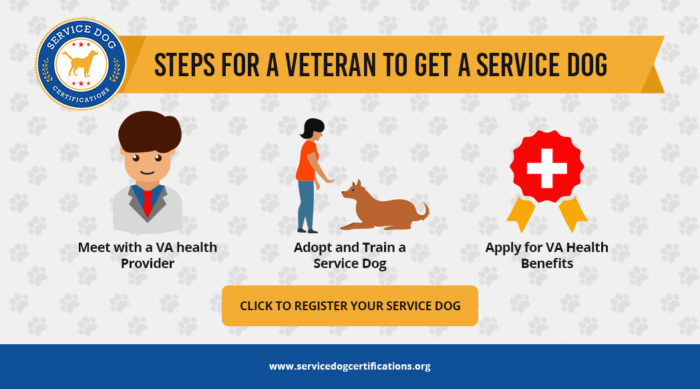Home Page › Blog › Steps for Veterans to Get a Service Dog
Steps for Veterans to Get a Service Dog

Unfortunately, many veterans suffer from a variety of disabilities after returning to civilian life. The Department of Veteran Affairs (VA) has reported that approximately 30% of veterans experience symptoms of Post-Traumatic Stress Disorder from experiencing war and/or assault.
Other veterans may have sustained an injury during their time in the military, or experience vision or hearing loss. If a veteran is experiencing significant physical, mental, or mobile limitations in their day-to-day life due to these disabilities, they may qualify for a Service Dog or an ESA.
If you think an ESA is right for you, learn how to qualify for an emotional support animal.
If you know that an ESA will help you, learn how to get an ESA Letter.
The VA has developed a program to provide qualified veterans with service dogs. Upon diagnosis of either a physical or mental disability, a veteran can apply to have a service dog that will be covered under veteran benefits.
In order to obtain a service dog through the VA, the veteran needs to follow these steps.
- Meet with a Health Provider
- Adopt and Train your Service Dog
- Apply for VA Benefits
1. Meet with a VA health provider
In order to qualify for a service dog, a veteran must be diagnosed with a disability. The Veteran may choose to work with a health provider through the Department of Veteran Affairs or outside of the VA.
The Veteran’s disability can be either physical or mental in nature. The health provider will evaluate the individual’s specific physical limitations to determine the best method of assistance. If the provider believes that a service dog will be the best form of treatment for the veteran, they will request the benefit through the local Prosthetic and Sensory Aids Service. The Prosthetic and Sensory Aids service will make the final decision by approving or disapproving the request.
The Veteran can also choose to work with a medical provider to determine their need for a Service Dog on their own. They are not bound by the VA as they are civilians now and can seek out solutions that work best for them.
2. Adopt and train a service dog
If the service dog application is approved, the dog needs to have the proper temperament and the ability to perform tasks needed to assist with the diagnosed disability. The VA doesn’t provide service dogs to veterans, but will often refer the veteran to accredited agencies, such as Assistance Dog International (ADI), that will raise and train service dogs that meet VA standards.
The VA also provides veterans the opportunity to train their own service dogs, if they so choose.
There are no required registrations or documentation that needs to be completed, but the dog still needs to meet the same standards that an agency-trained dog would meet. This includes ensuring the dog has the proper temperament, follows the desired commands, and is able to work in public around distractions.
If the Veteran has adopted and trained their Service Dog themselves, they have the option to register their service dog in a national database and order a custom Service Dog ID card along with a vest for their newly minted Service Dog.
3. Apply for VA Veterinary Health Benefits
Upon approval for a service dog, veterans can now have their service dog enrolled in Veterinary Health Benefits. These benefits includes comprehensive treatment and wellness checks, emergency care, immunizations, and illness treatment for the dog that will be serving the veteran. This is to ensure that the service dog remains in good health to best serve the veteran. They will also provide the proper equipment needed for the dog, such as a harness or vest. VA Health Benefits do not cover medications, food, or grooming assistance that is unrelated to the health of the dog.
Service dogs have proven to increase independence and provide feelings of comfort and safety for veterans that are suffering from debilitating disabilities. Service dogs aren’t pets to these individuals, but are working animals that have a strong desire to please their owners.
While not all dogs have the ability to become qualified as service dogs, those who do can make life-altering differences for their owners.

To register your Service Dog and order your Service Dog Certification, click on the link below.
About the Author: The writing team at Service Dog Certifications is made up of folks who really know their stuff when it comes to disability laws and assistance animals. Many of our writers and editors have service dogs themselves and share insights from their own experiences. All of us have a passion for disability rights and animals.
30 comments
Leave a Reply Cancel reply
Latest Posts

How to Bring a Service Dog to Disneyland
Trained service dogs are more than welcome to join their handlers at Disneyland. In this guide, we’ll explain Disneyland’s policies and give practical advice for bringing a service dog to Disneyland for the first time. Disneyland’s Service Dog Policies The Magic Kingdom is happy to welcome trained service dogs across most park locations! They kindly […]

Read More

Can Dogs Eat Tomatoes?
Yes! Dogs can safely enjoy tomatoes, but there are a few risks to be aware of so you can feed your dog responsibly. Fully ripe tomatoes (without the stems and leaves) can actually have nutrients that are good for your pup. Tomatoes have chlorogenic acid, an antioxidant that can have anti-inflammatory effects in cells. They’re […]

Read More

Can a Primary Care Doctor Write an ESA Letter?
Your family doctor, also called a primary care physician (PCP), can write a letter recommending an emotional support animal. We’ll explain what legally gives them that ability and explore what better options might be available for you. Why are Physicians Able to Write an ESA Letter? To turn your pet into an emotional support animal, […]

Read More








My name is Michael J. Daniels 4year verteran Air Force Turkey I suffer with PTSD, anxiety,and social phobia. Can I choose the dog I like. I been study the Belgian Malinois dog
We suggest consulting with your healthcare professional and possibly a trainer to see what breed may be appropriate for you. The right breed depends on the owner’s specific needs (i.e., the job they need the dog to perform in relation to their disability).
I have PTSD and a US Navy vet and was wondering how to have my cat put on as my emotional support animal
You may find this article helpful (the title says it’s for dogs, but the process for getting an emotional support cat is the same): https://www.servicedogcertifications.org/how-to-get-an-emotional-support-dog-letter/
I am a 100% mentally disabled veteran due to a service connect PTSD condition caused be sexual trauma while in the Military. I’m frequently emotional with depression, anxiety, flashbacks, violent nightmares, hearing voices and seeing hallucinations and have flashbacks and more symptoms while my time in the military. I live alone and feel a need to have a service dog to help me emotionally. I feel that it will help me cope with my issues. But I have one problem, my landlord does not accept pets of any kind at the apartments where I live. Is there anyway that you can look into this.
We strongly recommend speaking to your licensed therapist or doctor about your mental health issues. You may find these articles about PSDs and ESAs helpful:
https://www.servicedogcertifications.org/psychiatric-service-dog/
https://www.servicedogcertifications.org/emotional-support-dog-requirements/
I have one from the VA from a spinal injury, tbi, and my ptsd so don’t know why you did not get one from them.
This is very misleading. To receive benefits the dog has to be a graduate from an Assistance Dogs International program. Don’t go get a dog prior to talking to the program you plan to apply to. Many will not accept outside dogs and the ones that will have very specific requirements!
Service dogs do not have to be trained by any particular organization, they can even be self-trained by the owner.
The VA doesnt provide service dogs as of Feb 2022. Only Veterinarian insurance, which the dog has to graduate from ADI or the IDGF programs to qualify. The PAWS act is only a pilot program that will be in only 5 VA’s for five years. The sites have yet to be determined. There has been no guidelines as of yet on how the VA is going to implement this pilot program. To be determined.